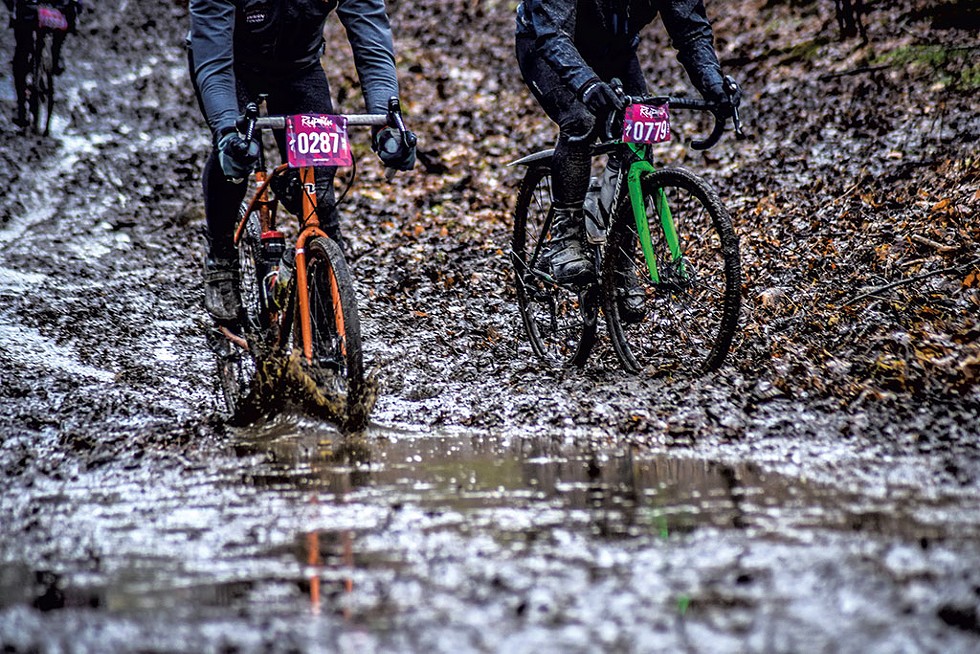
- Courtesy Of Nolan Myers
- Rasputitsa Spring Classic
In Vermont's Northeast Kingdom, Rasputitsa is far more peaceable but no less merciless on wheeled transport. The annual gravel bike race, departing from East Burke this year on Saturday, April 29, has its own well-earned reputation for vanquishing even the fiercest competitors with its often capricious weather and treacherous course conditions.
The 2019 Rasputitsa, in particular, was a "shit show," said race cofounder Anthony Moccia, 40, summing up the sentiments of many who rode that year. Just as competitors assembled at the start line, it began to rain, then sleet and hail. As temperatures plunged into the 30s, cyclists slogged through miles of muddy, rugged and, in places, unmaintained roads, some of which turned into streams. Sections of the course were completely unrideable.
Of the 1,500 or so riders who started the race, "Over 400 did not finish that year," recalled fellow Rasputitsa cofounder Heidi Myers, 44, barely concealing a mischievous smirk. "People were abandoning really expensive bikes on the side of the road and thumbing rides just to get out of the hypothermic conditions." The "broom wagon," the race van that normally sweeps up a few stragglers too exhausted to finish, was packed that year.
"But that's the beauty of Rasputitsa," she added. "Last year it was 70 degrees and dry. Spring in Vermont is beyond unpredictable."
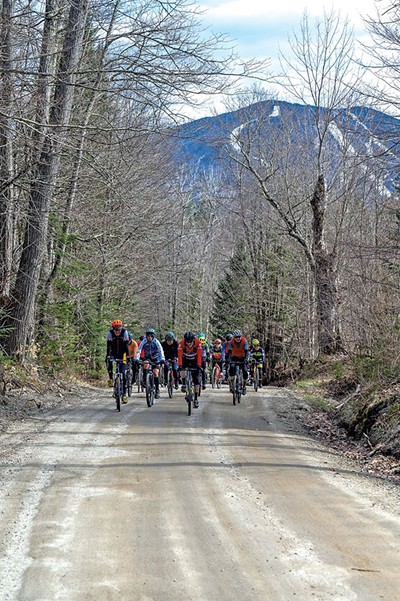
- Courtesy Of Luke Enright
- Rasputitsa Spring Classic
It's not the mercurial weather that sells out this first-of-the-season gravel bike race, which now attracts nearly 2,000 competitors, including Olympians and WorldTour racers, from around the globe. The annual presence of pro cyclists notwithstanding, Rasputitsa proudly celebrates its inclusive vibe, from its open field of competitors to its podiums for the top male, female and nonbinary finishers. The race's most exalted purse, the Lanterne Rouge, goes to the rider who finishes last.
Held in a drab month while the Northeast Kingdom still clings to winter, Rasputitsa is an early burst of spring color. Race volunteers dressed as yetis and rainbow unicorns hand out maple syrup in shot glasses made of ice. A New Hampshire salon owner, who races in Rasputitsa every year, sets up her stylist's chair beforehand to do riders' nails and weave their hair into braids with feathers. While many cyclists compete on state-of-the-art gravel bikes, others ride whatever two-wheelers they have, including hardtail mountain bikes, fat bikes, e-bikes, single speeds, even tandems.
"No unicycles yet, but we did have a recumbent bike one year," Myers recalled. "We hold no bike prejudices."
In the past decade, a growing number of cyclists, from recreational bikers to Tour de France veterans, have taken up gravel biking, fleeing the pavement to escape much of the traffic, noise and hazards of riding alongside cars, trucks and buses. In the process, they've discovered the myriad benefits of exploring the roads less traveled. And Vermont, whose unpaved byways are ideally suited to the sport, has become a gravel biking mecca, bringing tourism dollars to small, lesser-known communities, often at times of the year when little else is happening there.
The sport has bred a more sociable and community-minded cycling culture — one that, at times, rejects the affluence and elitism of traditional cycling. Now one of the fastest-growing sectors of the cycling market, gravel biking is about as low-barrier as a sport gets. All a rider has to do is cobble together a bike, then find a dirt road.
"It's definitely a different culture from what I came from," said Ian Boswell, a former WorldTour cyclist and Tour de France veteran who switched to gravel racing in 2019. "For so long, my perception of cycling was very narrow. It was elite riders trying to go as fast as they can, to be as fit as they could be, at the biggest races in the world."
An Oregon native, Boswell now lives with his Vermont-born wife and their 16-month-old daughter at the intersection of five dirt roads in Peacham. "Riding gravel wasn't something that I was seeking. It was more forced upon me," he said. But as he took to the windy, hilly and unpaved back roads of the Northeast Kingdom, he added, "It was a real rediscovery of what cycling is."
Have Bike, Will Gravel
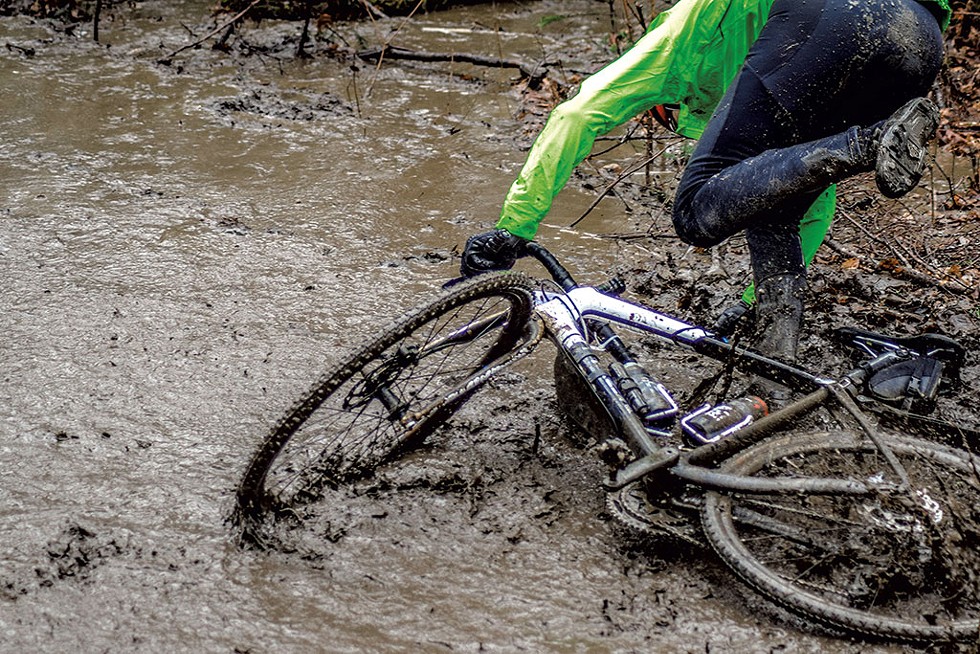
- Courtesy Of Nolan Myers
- Rasputitsa Spring Classic
There's nothing new or unique to Vermont about cycling on unpaved roads; people have been doing it since bicycles were invented. Cyclo-cross, a form of mixed-terrain circuit racing from which modern gravel biking evolved, actually began in the early 20th century as an off-season training method for Tour de France competitors. The Rough-Stuff Fellowship in England, founded in 1955, is considered the oldest off-road cycling group in the world. And "pass hunting," the hobby of bagging mountain passes on a bike, started in France, then became popular in Japan, decades before extreme mountain bikers started bombing down those same peaks.
"Everything old is new again in cycling," said Jon Copans, executive director of Old Spokes Home, a Burlington bike shop and nonprofit. "We love that trend towards getting out on dirt roads, unquestionably."
About a decade ago, bicycle manufacturers, noticing a growing consumer interest in cyclo-cross, began building bikes specifically for gravel. Early on, cynics scoffed that this "new" category was merely an industry ploy to sell consumers more pricey gear. But the technology advanced to the point where gravel bikes now occupy a versatile middle ground between sleek, narrow-wheeled road bikes and chunky, full-suspension mountain bikes, making them ideal for racing, touring and commuting.
At first glance, road bikes and gravel bikes look similar. Typically, both are lightweight and have drop handlebars, curved downward like rams' horns to lower the rider's posture and air resistance, thus making them faster. The bars on gravel bikes, though, flare outward slightly to provide more control and stability.
The primary differences between the two rides, Copans explained, are in their tire widths and air pressures. Designed to optimize efficiency, traditional road bikes have narrow, highly inflated tires compared to gravel rigs. The latter's beefier, lower-pressure tires provide better traction and stability on loose surfaces, offering a more comfortable ride. The geometry of gravel bikes is better suited to "more hours in the saddle," Copans said.
Long before the pandemic turbocharged all bicycles sales, retailers in Vermont were already seeing a surging interest in gravel bikes.
"People want gravel. That's what's hot right now," said Sequoia Young, department manager for bikes and car racks at Burlington's Outdoor Gear Exchange. In fact, so many cyclists have switched from road to gravel, she said, that last year OGE imposed "aggressive limitations" on the road bikes it will accept for consignment sales because so few consumers are buying them.
As Young, a former cyclo-cross racer and now an avid gravel biker, put it, "Why limit yourself [with a road bike] when you can go out and explore more?"
The Beauty of Back Roads
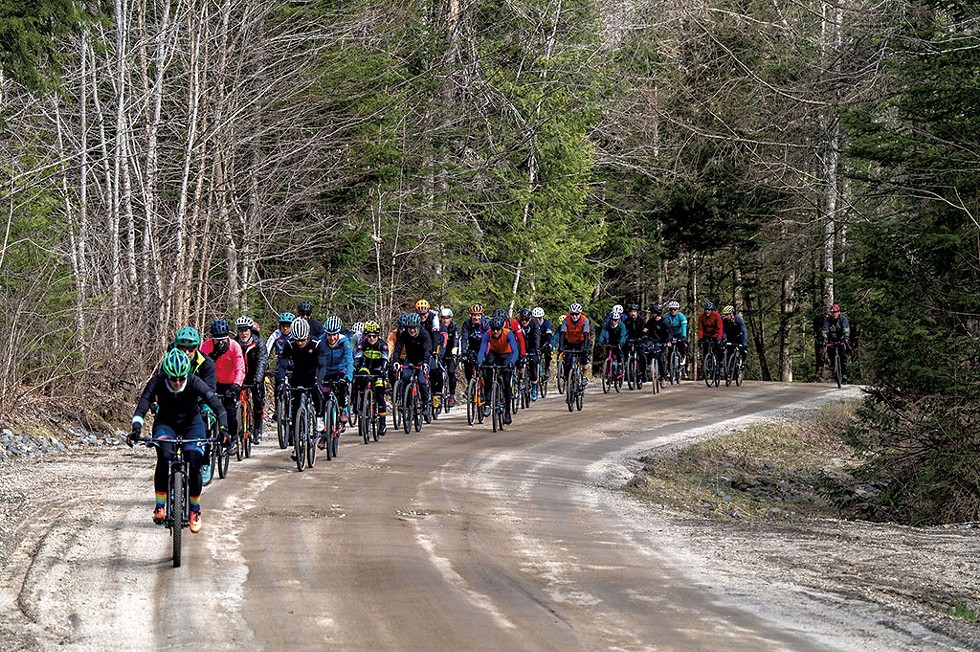
- Courtesy Of Luke Enright
- Rasputitsa Spring Classic, 2022
Indeed, gravel biking is right in Vermont's wheelhouse. The state has 8,579 miles of unpaved roads, compared to 7,182 miles of paved roads, according to the Vermont Agency of Transportation; that's the highest ratio of dirt to pavement of any state. Sixty percent of roads in the Northeast Kingdom are unpaved; Caledonia and Essex counties, home to Rasputitsa's sprawling racecourse, have nearly twice as many miles of dirt as pavement.
Those figures don't include Vermont's expanding network of off-road bike paths that are perfect for gravel bikes, including the 14-mile Island Line Rail Trail through Burlington and Colchester; the 26-mile Missisquoi Valley Rail Trail; and the 93-mile Lamoille Valley Rail Trail, which now spans the width of Vermont.
Part of gravel biking's appeal is riding what VTrans calls Class IV roads, or unmaintained public rights-of-way. These former logging roads, jeep trails and other historic paths are often the most rugged, challenging and sought-after by gravel riders.
Copans, who lives in Montpelier, said one of his favorite cycling activities is pulling out his old gazetteer and "hunting for the dotted lines," the Class IV roads. Often, there's not much of a road to follow, he said. But once he finds it, the challenge is to see whether it will lead him through the woods to a more established road and back to civilization.
"It's like a mini adventure in a three- to four-hour bike ride," he said.
But gravel biking need not be that adventurous, nor does it require an expensive bike specifically designed for gravel.
"Any bike can be a gravel bike as long as you have wider tires," said Kip Roberts, co-owner, with his wife, Jen, of Onion River Outdoors in Montpelier. "It's really just exploring where the paved road ends."
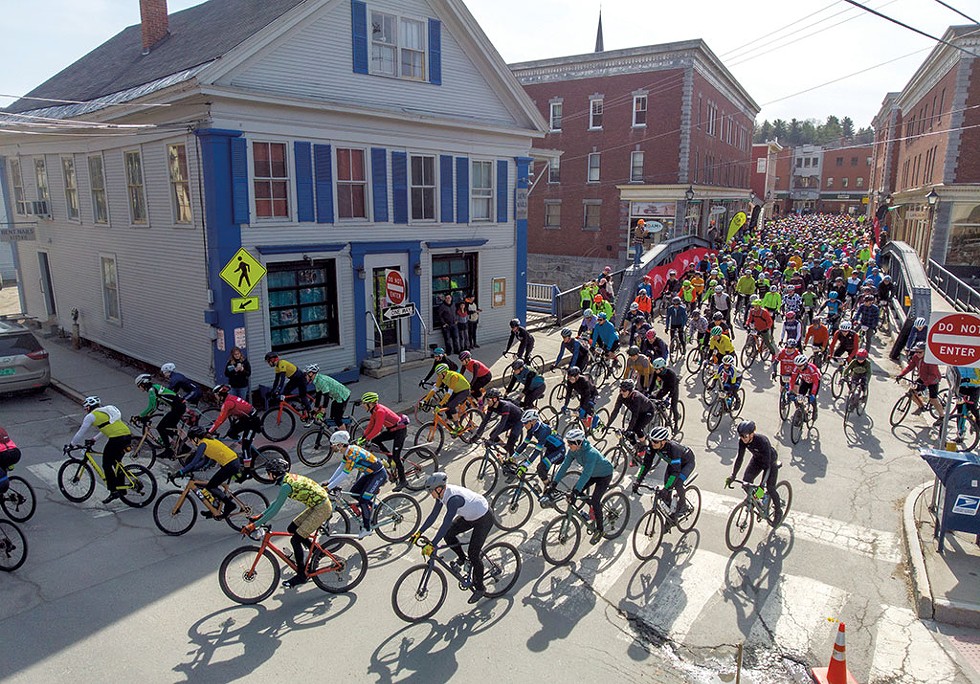
- File: Jeb Wallace-Brodeur
- Muddy Onion, 2022
For the past decade, Onion River Outdoors, previously known as Onion River Sports, has organized an annual spring gravel ride — not a race — called Muddy Onion. This year's was held the week before Rasputitsa. Muddy Onion began in 2013 with just a few dozen cyclists who'd meet in the store's parking lot.
"Now, we hardly sell any road bikes anymore," Roberts said. "Gravel bikes are a year-round category for us."
It seems counterintuitive, but riding on dirt can actually result in less wear and tear on your bike, noted Josh Saxe, who runs Jackalope Sports Group, an independent sales agency in Montpelier that specializes in cycling, skiing and other outdoor gear.
Saxe founded a race team called Jackalope Northeast Cycling, which competes in gravel, road, cyclo-cross and mountain bike events — "basically, everything on two wheels," he said. The team eschews the term "elite" to describe its professional athletes, preferring instead to call them its "fringe division." Its sponsors include a Charlotte coffee company that makes virtually all of its deliveries by gravel bike. (See below.)
About a decade ago, Jackalope team members switched most of their training from blacktop to dirt, both to avoid most motorized traffic and because the paved roads were in such poor shape, especially by the end of winter.
"When we'd ride on pavement, there'd be glass, nails, potholes, and you would get flats left and right," Saxe said. "So we said, 'Oh, let's ride the back roads,' and we got fewer flats."
Like nearly all other gravel riders interviewed for this story, Saxe cited safety concerns as one of the reasons for getting off the pavement — and with good reason. According to VTrans, of the 860 cycling-related injuries and fatalities reported to the state between 2010 and 2022, only 14 occurred on gravel roads.
"There are a lot of distractions when it comes to pavement. People are moving faster in their cars, and it's a little scarier," Moccia said. "But you can get on a dirt road and see just a handful of cars in a couple of hours ... and you don't have to worry about that big 18-wheeler coming up behind you."
Like any form of cycling, gravel biking isn't without dangers. The community was reminded of that during last August's Vermont Overland, a 59-mile gravel race that starts in West Windsor. Suleiman "Sule" Kangangi, a 33-year-old professional rider from Kenya and a giant in Africa's cycling community, died from injuries he sustained in an unwitnessed crash. Seven Days reported on the tragic accident in a story published last fall. The fact that Kangangi wiped out on a long, straight, downhill section of the course, with good visibility, only compounded the mystery of his death.
Shifting Into High Gear
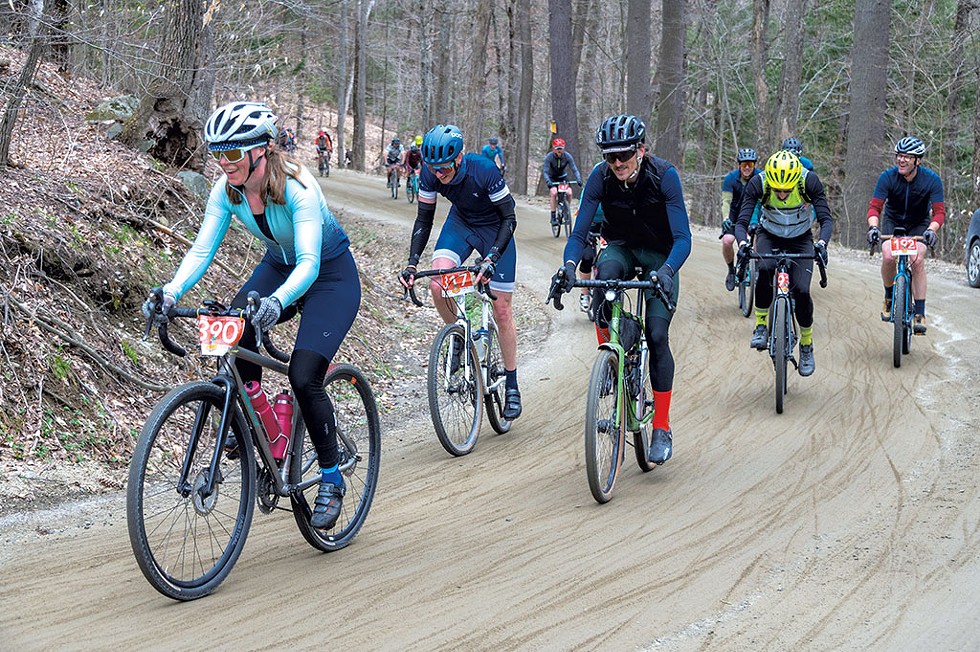
- File: Jeb Wallace-Brodeur
- Muddy Onion, 2023
In Vermont, gravel biking began for many riders as a transitional activity — something to do after the ski-and-ride slopes closed and before the mountain bike trails were dry enough to open. However, as the sport has grown and climate change has imperiled all winter recreation, gravel biking has become a three-season activity and an economic engine for small towns and villages throughout the state.
Rasputitsa's founders didn't choose to hold their "gravel grinder" during mud season to make the race more punishing. Rather, April is a month when most athletes' schedules are wide open, Myers noted.
More importantly, Rasputitsa provides a much-needed boost to the Northeast Kingdom's small businesses at a time of year when little else is happening there. The race attracts thousands of riders to the community of East Burke. Once there, those visitors spend money at local gas stations, restaurants, inns and general stores.
Carolyn Elliott, who manages the Inn at Mountain View Farm in East Burke, booked all of her 14 rooms and suites well in advance of the last week of April, thanks to the race. Ordinarily, the inn quiets down at the end of ski season in March and doesn't pick up again until June weddings. Were it not for Rasputitsa, she said, "We would have nobody here."
Other nearby businesses have also benefited, either directly from Rasputitsa or indirectly from gravel biking's rising influence. Just down the road from the inn is KC&E Adventures in Lyndonville. Its office is adjacent to the Kingdom Trails mountain biking network — those tracks are currently closed for mud season — and the business has seen growing consumer demand for gravel tours.
Co-owner Collin Daulong, 36, started KC&E Adventures with his wife, Caitlin, in 2015. For the first few years, the company focused primarily on road and mountain biking, but it has since expanded into gravel tours of two, three and five hours in the Northeast Kingdom.
Part of the appeal, Daulong explained, is that gravel biking occupies a more comfortable "middle ground" for clients who want to be out in nature but are intimidated by riding on traffic-filled highways or on single-track mountain bike trails that lead deep into the woods.
Gravel's global ascension has also been a boon to other Vermont firms. VBT Bicycling Vacations, a Williston-based tour company that's been in business for 52 years and employs about 70 people worldwide, holds most of its trips outside the U.S. Jamen Yeaton-Masi, vice president of worldwide operations, said VBT doesn't specifically market its vacations as "gravel tours." Nevertheless, because most of its guests are in their sixties, she said, it leans toward "off-the-beaten-path gravel riding on quiet roads and side roads."
Among the company's most popular domestic trips are its fall tours in Vermont, including one that runs from Burlington to North Hero via the Island Line Rail Trail. Another is a newly added gravel bike tour of the carriage roads in Maine's Acadia National Park.
"The popularity of gravel biking has helped us tremendously," Yeaton-Masi added, "because that's what we've always focused on."
Although no one has drilled down to gauge the economic impact of gravel biking compared to other forms of cycling, "We are hearing more and more about gravel biking, so people are definitely interested in it," said Abby Sessock, director of digital communications at the Vermont Department of Tourism and Marketing.
In the past few years, the state has produced sponsored content for national publications on the many cycling opportunities available in Vermont. One, published last June in Outside magazine, was titled "Your Guide to Vermont's Best Bike Rides" and included a section on "The Gravel Ride of Your Dreams" in and around Manchester.
Gravel's popularity is also cranking up the economies of smaller, less-visited communities as the state builds out its cycling infrastructure. A study released in March by the Northeastern Vermont Development Association found that the Lamoille Valley Rail Trail has the potential to generate $4.7 million annually in sales activity and $538,000 in tax revenues in towns such as St. Johnsbury, Danville, Hardwick, Greensboro and Cabot.
That study's findings are consistent with those of another done last year on the Missisquoi Valley Rail Trail, which found that trail users generated nearly $2 million in annual sales activity and $208,000 in tax revenues.
All Bodies, All Bikes
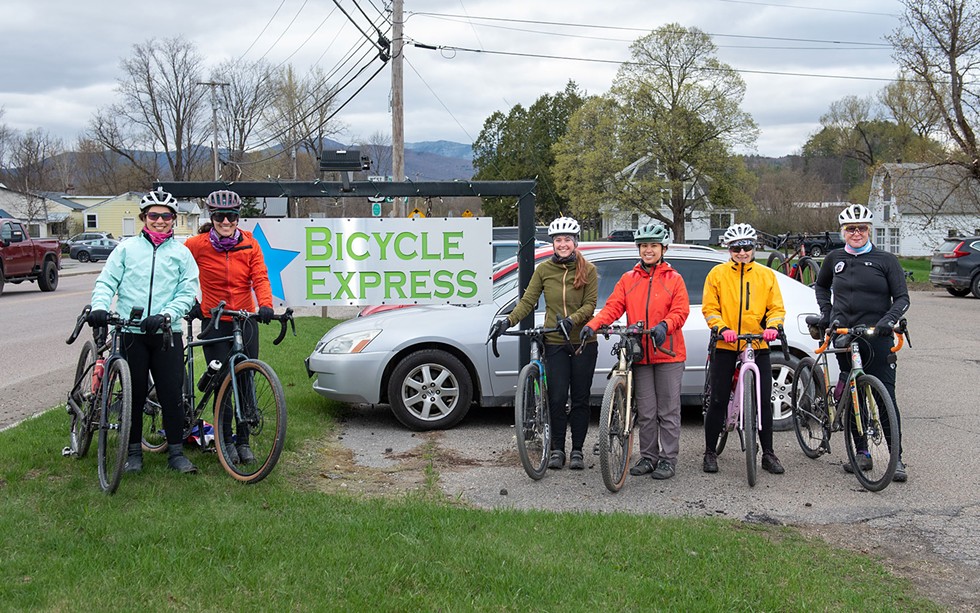
- Kevin Goddard
- Waterbury women's cycling group
Gravel's rise as a sport offers more than just the potential for generating tourism dollars. Less-traveled dirt roads enable cyclists to safely ride two or three abreast — a more relaxed and sociable pedaling experience. As Onion River's Roberts put it, when you're gravel biking on a quiet country road, "You're not stuck in a road biker's pace line, shouting at the person's butt in front of you."
For her part, Sessock isn't just promoting the sport from behind her desk at the tourism department. An avid gravel biker herself — Sessock was one of the 400-plus riders who didn't finish Rasputitsa in 2019 — she's started a weekly gravel ride for women, trans and female-identifying cyclists. The group, which meets every Wednesday evening at Bicycle Express in Waterbury, was created for those who "want to ride with others but might be intimidated by some group rides," she said.
Sessock described it as a "no-drop social ride," meaning the group stops periodically to ensure that all the riders are still together. "It's comfortable, it's inviting, and we're not gonna leave you in the dust," she said.
Rasputitsa shares a similar ethos, in part because it didn't grow out of traditional bike racing culture. In many ways, the event was a reaction to it.
Cofounder Myers spent nearly 20 years working at Louis Garneau, a cycling gear and apparel company based in Derby. Though she liked the company and learned a lot, there was much about the industry that turned her off. She often found traditional cycling to be classist, elitist and male-dominated, a sport that celebrated a specific body type: that of the tall, svelte and muscular athlete.
Myers and Moccia didn't start Rasputitsa to deliberately usurp that paradigm. But when they created the race, they envisioned it as having a more inclusive and community-oriented focus. Both had ridden in an annual gravel grinder in Minnesota called Almanzo 100, which has always been free to enter.
"That was the motivator for us to embrace something different," Myers said. "We saw that event in Minnesota and [realized that] gravel roads are something we have a lot of in Vermont."
The first gravel race they organized, in Derby and Newport in 2013, was the Dirty 40, so named for the 40 miles of dirt road in the 60-mile course. The following year, they moved the race to Burke, Newark and East Haven and renamed it Rasputitsa. They chose the Russian moniker, in part, as a historical nod to the now-abandoned radar towers on a mountaintop in East Haven, which were used at the height of the Cold War to alert the U.S. military to incoming Soviet missiles and bombers.
Rasputitsa's notorious Class IV stretch of road, dubbed Cyberia, was actually the result of what Myers called "a colossal mistake." The organizers had marked the first racecourse using GPS before they actually rode it. Once they did, just weeks before race day, they discovered that the "road" was actually several miles of unplowed, snow- and ice-covered snowmobile trail. However, because the maps had already been printed, they had to keep it in. Cyberia has since become the event's marquee section.
Rasputitsa has always been a passion project for Myers and Moccia — she works in marketing at Sterling College; he's a sales manager for a Derby building supply company. It was never meant to be a moneymaker. Historically, they've donated much of the race proceeds to charity. In 2019, they gave $18,000 to Little Bellas, a Williston-based nonprofit that mentors girls through mountain biking. Beginning last year, Rasputitsa partnered with Pride Rides VT to add a “shakeout ride” on the day before the big race to give voice to the LGBTQ community. This year’s Pride Rides will also feature drag queen Emoji Nightmare.

- Kevin Goddard
- Waterbury women's cycling group
Rasputitsa began as a single-distance race and has evolved to include three different loops in order to attract a wider field of competitors and ability levels. This year, its loops are named for 1990s hip-hop artists: the 40-kilometer Snoop Dogg, which, despite its namesake, gets the least high of the loops, gaining just 3,300 vertical feet; the 70-kilometer Wu-Tang, which climbs 5,300 feet; and the 100-kilometer Notorious B.I.G., which ascends 7,100 feet. Each has a different start time, which enables riders to finish together at the Burke Mountain lodge.
"They all blend at the end, and that's a beautiful thing," Myers said.
Even Rasputitsa's more competitive cyclists have embraced this egalitarian spirit. Mike Barton, a 49-year-old amateur cyclist and full-time engineer from Hanover, N.H., rides in gravel races around the country. In 2019, he entered Dirty Kanza — one of the world's largest and most prestigious gravel races, now called UNBOUND Gravel — in Emporia, Kan., and finished 16th overall out of 2,750 cyclists, besting riders half his age.
But Barton, who's raced in Rasputitsa four times — he placed third overall in 2017 and has never finished outside the top 10 — said he loves that Rasputitsa isn't a celebration of the fittest and fastest.
"You'll always find someone to ride with, and you'll never ride alone," he said. "If you're gunning for a good finish and something bad happens, you can regroup and just ride with a bunch of people, and it's gonna be fun."
Kayla Brannen, owner of Maven Salon in Hanover, N.H., is the cyclist who does riders' hair and nails before race time. She and her husband, Barney, are "the OGs" who've been riding in Rasputitsa since its inception in 2014.
Among the many things Brannen loves about Rasputitsa is the individuality of competitors. It's not all spandex and nylon, she said; some people show up in jeans and flannel shirts.
But the real charm of Rasputitsa, Brannen said, is that she and her husband, who are evenly matched in fitness and ability level, get to ride together, unlike at many cycling events, which segregate competitors by gender.
"One of us may surge ahead," she said, "but by the end, we're finishing it together."
Down the Road
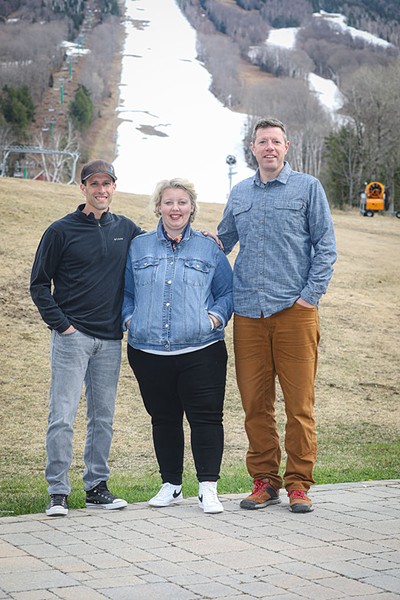
- Steve Legge
- From left, Rasputista organizers Anthony Moccia, Heidi Myers and Jeff Price
As Rasputitsa's national reputation has grown, it's attracted regional and national media attention, from specialized cycling publications such as Bicycling and Pedal magazines to mainstream periodicals such as Men's Journal and Sports Illustrated. The race has grown from 400 riders in 2014 to about 2,000 this year. Competitors have traveled from at least 46 U.S. states, five Canadian provinces and Europe.
In 2020 and 2021, Rasputitsa took a pandemic-induced pause, which gave Myers and Moccia time to step back and reassess where the race was headed and whether it was remaining true to its founding principles of "the three Cs: cycling, community and charity."
"It's easy to get consumed with the excitement of professionals and that 1 percent and have them more in mind," Moccia said. "We gave ourselves that reality check. There's still that other 99 percent out there. Let's give them more attention."
This year, Rasputitsa is among at least nine major gravel events in the state, including Vermont Overland and the Peacham Fall Fondo. The latter is organized by Boswell, who's now a professional gravel rider. He won the 200-mile UNBOUND Gravel in 2021 and topped the Rasputitsa men's podium last year in the 100-kilometer category.
As gravel racing continues to expand, Boswell echoed the importance of keeping the community in focus. He acknowledged that the sport has changed in the past three years, with races becoming more competitive — and expensive — and some athletes having full-time jobs as gravel racers. Even though Rasputitsa has become a nationally recognized event, Boswell appreciates that it maintains its grassroots, participatory feel.
"Most of the people are just there to ride and enjoy the experience of being there," he said.
"My wife would never sign up for a road race. She would never sign up for a cyclo-cross race," he continued. "But she could go to Rasputitsa or Overland and have a good time and ride with friends and have a great experience.
"In gravel, as big as some of these events are, they're really just a culmination of people coming together for a shared experience," he added. "The race itself is oddly secondary to the gathering of like-minded people."
Barton, the amateur cyclist from Hanover, thinks the sport is more than just a passing industry fad. "Gravel biking, for me, could stand the test of time," he said. "It's just sublime."
And in Vermont, it's just getting cranking.
Powered by Caffeine
A Charlotte roaster pedals coffee by the pound

- Courtesy
- Steve Colangeli
On a sunny, cold March afternoon, Steve Colangeli hopped on his gravel bike, shouldered a 10-pound, mud-speckled backpack and began a 16-mile journey, mostly on rural dirt roads. He wasn't out riding recreationally but delivering freshly roasted coffee beans to local customers, with the words "Roasted in Charlotte, VT" emblazoned across the butt of his cycling pants.
In 2016, Colangeli cofounded Paradiso Farm Coffee with his live-in partner, Dovie Bailey. For Colangeli, a former competitive cyclist at the University of Rhode Island, delivering coffee by bike was part of his business plan from day one.
"I have such a passion for biking and coffee," he said, "I figured I'd combine the two."
In fact, when Colangeli set up the coffee-roasting operation as a side hustle — he also works full time as a Middlebury Union High School science teacher — a business mentor pressed him on whether his bicycle delivery time would be better spent on other tasks. But Colangeli immediately discovered that making deliveries by bike led to conversations with new and existing customers that wouldn't have happened otherwise.
Colangeli delivers by bike year-round, even in the snow, until the temperature falls below 10 degrees. Many of his customers, such as Shelburne Farms and Philo Ridge Farm, aren't far from his home in Charlotte, though he occasionally makes deliveries to the Middlebury Natural Foods Co-op 30 miles away. In all, he pedals 20 to 40 miles per week — not including his recreational cycling — sometimes pulling 40 pounds of coffee on a trailer.
"When you're on a bike," he said, "you see a lot of things that you wouldn't see driving. Things just slow down." Once, he halted a delivery to watch a calf being born.
There's an added bonus to making deliveries by bike: The load gets lighter the longer he rides.
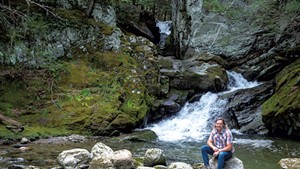
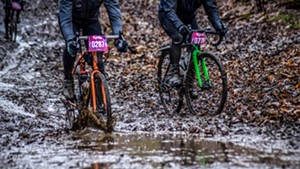









Comments
Comments are closed.
From 2014-2020, Seven Days allowed readers to comment on all stories posted on our website. While we've appreciated the suggestions and insights, right now Seven Days is prioritizing our core mission — producing high-quality, responsible local journalism — over moderating online debates between readers.
To criticize, correct or praise our reporting, please send us a letter to the editor or send us a tip. We’ll check it out and report the results.
Online comments may return when we have better tech tools for managing them. Thanks for reading.